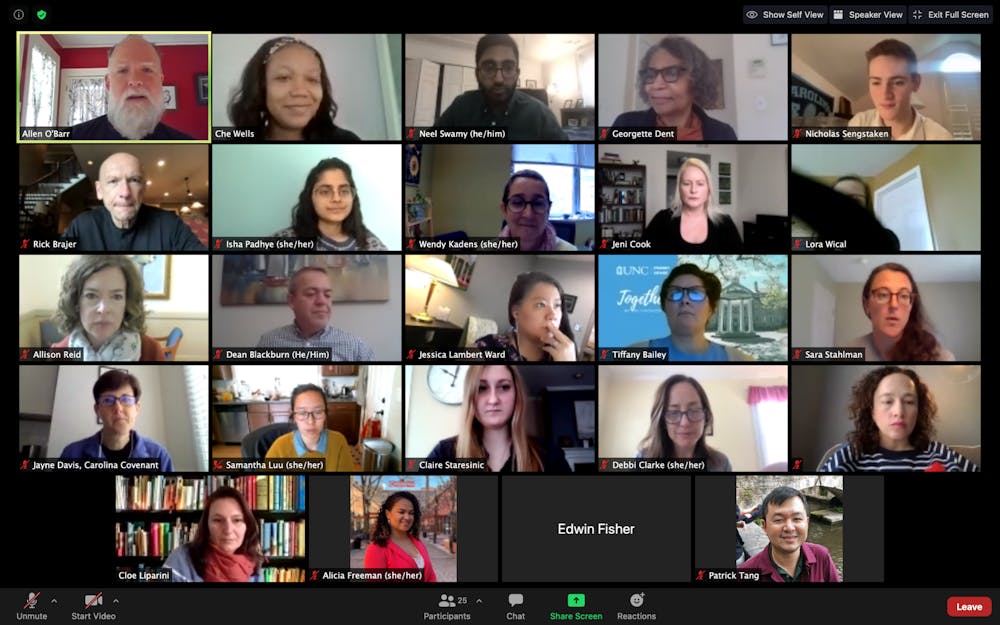UNC CAPS is currently in the process of hiring a trainee who can represent the Asian American and Pacific Islander community on its staff, Dr. Allen Hamrick O’Barr said at a meeting of the Mental Health Task Force on Thursday.
At the meeting, students and faculty at UNC discussed how to help students who are struggling with identity trauma brought up by the current racial unrest.
What’s new?
- O’Barr, the director of counseling and psychological services at UNC, addressed the lack of Asian American and Pacific Islander representation at CAPS at the start of the meeting.
- He said they were currently in the process of using gift money to hire a post-master's of social work fellow trainee. They are hoping to have the person hired by July. This is a temporary solution until the next time CAPS has staff turnover, O’Barr said.
- Samantha Luu, associate director for UNC-CH Peer Support Core, has been working with different affinity groups based on identity and race.
- In the Gillings School of Global Public Health, two Asian-identifying faculty members have created a pod for AAPI faculty, staff and students, Luu said.
- It is difficult to extend this effort without volunteers coming forward to lead them, she said.
- Eesha Desai, an undergraduate senator, said a group of students reached out to UNC Senate district representatives about AAPI representation in mental health. They provided a list of ideas for responses to racial violence that they would like to see in use, sent via email.
- Topics within the email included a dedicated committee to determine protocol activation, timing of communal support, reaching out to student groups to acknowledge trauma, protection for absences and extensions and developing trainings similar to those in place at the University of California, San Francisco.
- Jessica Lambert Ward, director of the Carolina Collaborative for Resilience, said these issues are exactly what the Carolina Collaborative Community is trying to build on with their community in their launch this fall.
- “The overall goal of the collaborative is to provide non-clinical, identity-based trauma support and resources for our students through the use of resilience coaches,” Ward said.
- Resilience coaches will be faculty and staff with whom a student may share an identity, she said. They will link students to support networks. Within the next month, they hope to begin recruiting coaches to train over summer, as to hit the ground running come fall, Ward said.
- “We’re actually working with students to understand where sources of resilience can come from within themselves, whether that’s from their family or their spirituality or in community or in networking,” she said.
- Isha Padhye, the co-chairperson for the Mental Health Committee within the UNC Student Government Executive Branch, posed the idea of creating a protocol for professors to give students time to process racial and identity trauma before jumping back into academic work.
- Debbi Clarke, associate provost for strategy and special projects, who works closely with the Faculty Council and Educational Policy Committee, said they needed to help faculty, especially those from a majority background, understand racial trauma.
- Cloe Liparini, director of education, community engagement and belonging within the University Office for Diversity & Inclusion, suggested that the University Diversity, Equity & Inclusion Council work with the deans of inclusive excellence to influence their specific school or unit to think about implementation.
- Attendees then discussed the resources available for the upcoming weeks, during which dates such as the one-year anniversary since the death of George Floyd will occur, which may trigger racial trauma for some students.
- Liparini said the DEI is working with the chancellor to make messages proactive rather than reactive.
- Neel Swamy, president of the Graduate and Professional Student Government, suggested the creation of a comment box for students to share their thoughts with the task force, allowing them to reconfigure in preparation for next semester.
- Finally, funding for the ideas mentioned was discussed.
- O’Barr said he would like to acknowledge that CAPS is making progress, but they are behind because there is no existing funding to make change.
- Chancellor’s Fellow Nick Sengstaken is benchmarking how other schools are structuring their clinical and non-clinical support, and he said the University can look to its peers to see how they are funding themselves.
What’s next?
- A representative from the Office of University Counsel will sit in on a future meeting to determine liabilities regarding a potential UNC crisis line, which was discussed at the previous meeting.
- The task force plans to send out a message to students, letting them know that the task force is planning for the future, as well as affirming that there is a group looking out for students.



